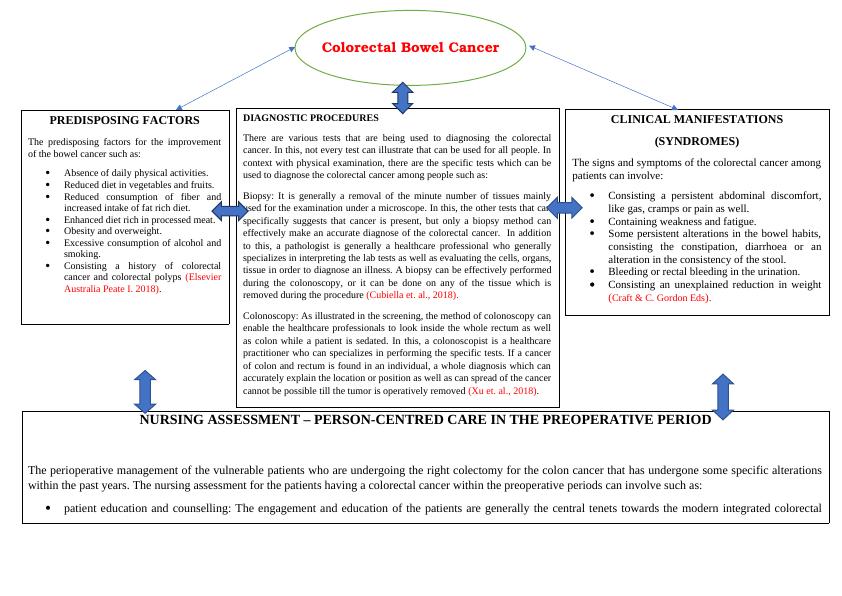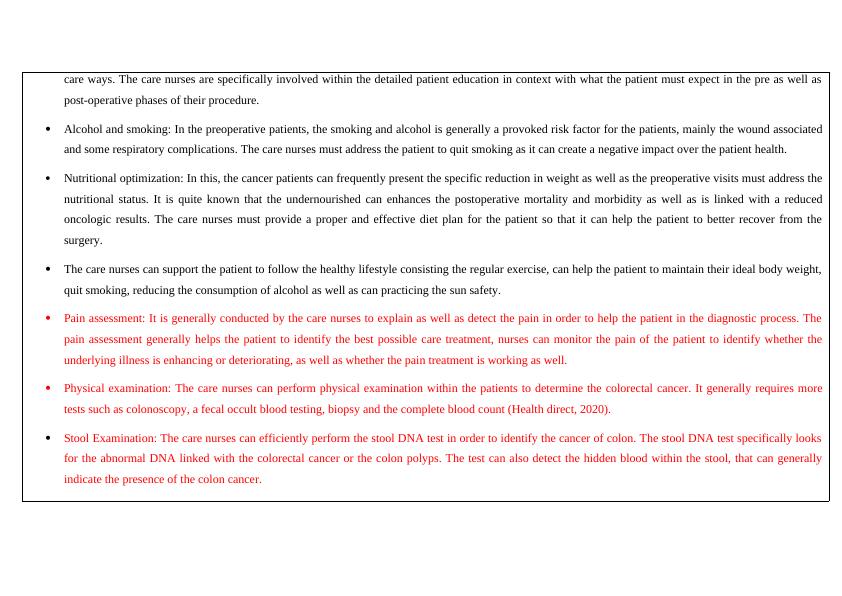Colorectal Bowel Cancer: Predisposing Factors, Diagnostic Procedures, Clinical Manifestations, and Nursing Assessment
Added on 2023-06-11
4 Pages1195 Words249 Views
NURSING ASSESSMENT – PERSON-CENTRED CARE IN THE PREOPERATIVE PERIOD
The perioperative management of the vulnerable patients who are undergoing the right colectomy for the colon cancer that has undergone some specific alterations
within the past years. The nursing assessment for the patients having a colorectal cancer within the preoperative periods can involve such as:
patient education and counselling: The engagement and education of the patients are generally the central tenets towards the modern integrated colorectal
PREDISPOSING FACTORS
The predisposing factors for the improvement
of the bowel cancer such as:
Absence of daily physical activities.
Reduced diet in vegetables and fruits.
Reduced consumption of fiber and
increased intake of fat rich diet.
Enhanced diet rich in processed meat.
Obesity and overweight.
Excessive consumption of alcohol and
smoking.
Consisting a history of colorectal
cancer and colorectal polyps (Elsevier
Australia Peate I. 2018).
DIAGNOSTIC PROCEDURES
There are various tests that are being used to diagnosing the colorectal
cancer. In this, not every test can illustrate that can be used for all people. In
context with physical examination, there are the specific tests which can be
used to diagnose the colorectal cancer among people such as:
Biopsy: It is generally a removal of the minute number of tissues mainly
used for the examination under a microscope. In this, the other tests that can
specifically suggests that cancer is present, but only a biopsy method can
effectively make an accurate diagnose of the colorectal cancer. In addition
to this, a pathologist is generally a healthcare professional who generally
specializes in interpreting the lab tests as well as evaluating the cells, organs,
tissue in order to diagnose an illness. A biopsy can be effectively performed
during the colonoscopy, or it can be done on any of the tissue which is
removed during the procedure (Cubiella et. al., 2018).
Colonoscopy: As illustrated in the screening, the method of colonoscopy can
enable the healthcare professionals to look inside the whole rectum as well
as colon while a patient is sedated. In this, a colonoscopist is a healthcare
practitioner who can specializes in performing the specific tests. If a cancer
of colon and rectum is found in an individual, a whole diagnosis which can
accurately explain the location or position as well as can spread of the cancer
cannot be possible till the tumor is operatively removed (Xu et. al., 2018).
CLINICAL MANIFESTATIONS
(SYNDROMES)
The signs and symptoms of the colorectal cancer among
patients can involve:
Consisting a persistent abdominal discomfort,
like gas, cramps or pain as well.
Containing weakness and fatigue.
Some persistent alterations in the bowel habits,
consisting the constipation, diarrhoea or an
alteration in the consistency of the stool.
Bleeding or rectal bleeding in the urination.
Consisting an unexplained reduction in weight
(Craft & C. Gordon Eds).
Colorectal Bowel Cancer
The perioperative management of the vulnerable patients who are undergoing the right colectomy for the colon cancer that has undergone some specific alterations
within the past years. The nursing assessment for the patients having a colorectal cancer within the preoperative periods can involve such as:
patient education and counselling: The engagement and education of the patients are generally the central tenets towards the modern integrated colorectal
PREDISPOSING FACTORS
The predisposing factors for the improvement
of the bowel cancer such as:
Absence of daily physical activities.
Reduced diet in vegetables and fruits.
Reduced consumption of fiber and
increased intake of fat rich diet.
Enhanced diet rich in processed meat.
Obesity and overweight.
Excessive consumption of alcohol and
smoking.
Consisting a history of colorectal
cancer and colorectal polyps (Elsevier
Australia Peate I. 2018).
DIAGNOSTIC PROCEDURES
There are various tests that are being used to diagnosing the colorectal
cancer. In this, not every test can illustrate that can be used for all people. In
context with physical examination, there are the specific tests which can be
used to diagnose the colorectal cancer among people such as:
Biopsy: It is generally a removal of the minute number of tissues mainly
used for the examination under a microscope. In this, the other tests that can
specifically suggests that cancer is present, but only a biopsy method can
effectively make an accurate diagnose of the colorectal cancer. In addition
to this, a pathologist is generally a healthcare professional who generally
specializes in interpreting the lab tests as well as evaluating the cells, organs,
tissue in order to diagnose an illness. A biopsy can be effectively performed
during the colonoscopy, or it can be done on any of the tissue which is
removed during the procedure (Cubiella et. al., 2018).
Colonoscopy: As illustrated in the screening, the method of colonoscopy can
enable the healthcare professionals to look inside the whole rectum as well
as colon while a patient is sedated. In this, a colonoscopist is a healthcare
practitioner who can specializes in performing the specific tests. If a cancer
of colon and rectum is found in an individual, a whole diagnosis which can
accurately explain the location or position as well as can spread of the cancer
cannot be possible till the tumor is operatively removed (Xu et. al., 2018).
CLINICAL MANIFESTATIONS
(SYNDROMES)
The signs and symptoms of the colorectal cancer among
patients can involve:
Consisting a persistent abdominal discomfort,
like gas, cramps or pain as well.
Containing weakness and fatigue.
Some persistent alterations in the bowel habits,
consisting the constipation, diarrhoea or an
alteration in the consistency of the stool.
Bleeding or rectal bleeding in the urination.
Consisting an unexplained reduction in weight
(Craft & C. Gordon Eds).
Colorectal Bowel Cancer

care ways. The care nurses are specifically involved within the detailed patient education in context with what the patient must expect in the pre as well as
post-operative phases of their procedure.
Alcohol and smoking: In the preoperative patients, the smoking and alcohol is generally a provoked risk factor for the patients, mainly the wound associated
and some respiratory complications. The care nurses must address the patient to quit smoking as it can create a negative impact over the patient health.
Nutritional optimization: In this, the cancer patients can frequently present the specific reduction in weight as well as the preoperative visits must address the
nutritional status. It is quite known that the undernourished can enhances the postoperative mortality and morbidity as well as is linked with a reduced
oncologic results. The care nurses must provide a proper and effective diet plan for the patient so that it can help the patient to better recover from the
surgery.
The care nurses can support the patient to follow the healthy lifestyle consisting the regular exercise, can help the patient to maintain their ideal body weight,
quit smoking, reducing the consumption of alcohol as well as can practicing the sun safety.
Pain assessment: It is generally conducted by the care nurses to explain as well as detect the pain in order to help the patient in the diagnostic process. The
pain assessment generally helps the patient to identify the best possible care treatment, nurses can monitor the pain of the patient to identify whether the
underlying illness is enhancing or deteriorating, as well as whether the pain treatment is working as well.
Physical examination: The care nurses can perform physical examination within the patients to determine the colorectal cancer. It generally requires more
tests such as colonoscopy, a fecal occult blood testing, biopsy and the complete blood count (Health direct, 2020).
Stool Examination: The care nurses can efficiently perform the stool DNA test in order to identify the cancer of colon. The stool DNA test specifically looks
for the abnormal DNA linked with the colorectal cancer or the colon polyps. The test can also detect the hidden blood within the stool, that can generally
indicate the presence of the colon cancer.
post-operative phases of their procedure.
Alcohol and smoking: In the preoperative patients, the smoking and alcohol is generally a provoked risk factor for the patients, mainly the wound associated
and some respiratory complications. The care nurses must address the patient to quit smoking as it can create a negative impact over the patient health.
Nutritional optimization: In this, the cancer patients can frequently present the specific reduction in weight as well as the preoperative visits must address the
nutritional status. It is quite known that the undernourished can enhances the postoperative mortality and morbidity as well as is linked with a reduced
oncologic results. The care nurses must provide a proper and effective diet plan for the patient so that it can help the patient to better recover from the
surgery.
The care nurses can support the patient to follow the healthy lifestyle consisting the regular exercise, can help the patient to maintain their ideal body weight,
quit smoking, reducing the consumption of alcohol as well as can practicing the sun safety.
Pain assessment: It is generally conducted by the care nurses to explain as well as detect the pain in order to help the patient in the diagnostic process. The
pain assessment generally helps the patient to identify the best possible care treatment, nurses can monitor the pain of the patient to identify whether the
underlying illness is enhancing or deteriorating, as well as whether the pain treatment is working as well.
Physical examination: The care nurses can perform physical examination within the patients to determine the colorectal cancer. It generally requires more
tests such as colonoscopy, a fecal occult blood testing, biopsy and the complete blood count (Health direct, 2020).
Stool Examination: The care nurses can efficiently perform the stool DNA test in order to identify the cancer of colon. The stool DNA test specifically looks
for the abnormal DNA linked with the colorectal cancer or the colon polyps. The test can also detect the hidden blood within the stool, that can generally
indicate the presence of the colon cancer.

End of preview
Want to access all the pages? Upload your documents or become a member.
Related Documents
Pathophysiology Assignment: HTH 116lg...
|5
|991
|97
Partnership in Health and Illnesslg...
|10
|2715
|84
Discharge Planning for Colorectal Cancer Patientslg...
|9
|2019
|68
Oncology Nursing: Management for 3rd Stage Colorectal Cancerlg...
|11
|2979
|52
Preventive Screening Test of the Geriatrics Community Populationlg...
|4
|1347
|22
How Effective Is Colorectal Cancer Screening in detecting and treating colon cancer on women aged between 55 and 65 years old?lg...
|11
|3772
|24
